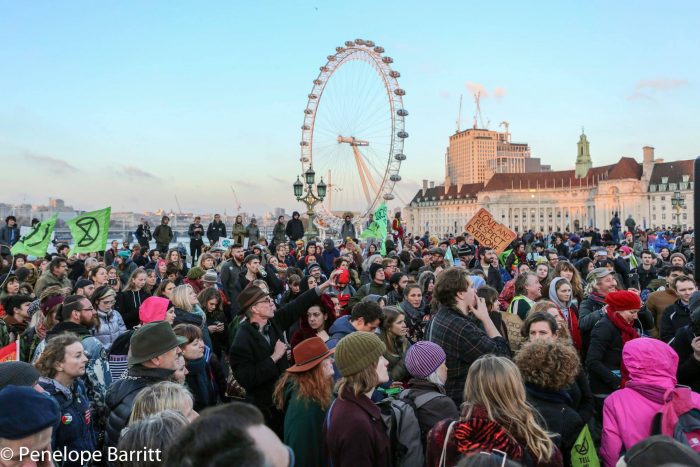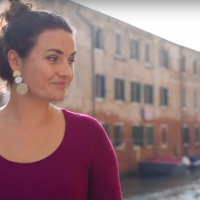Yesterday, magic happened in London town.
You may not have heard about it yet, but across the world people are rising up to take action in defence of the planet, in a movement called Extinction Rebellion.
And yesterday, me—your standard, boring, stay-at-home mama—was part of the rebellion, which took over five of London’s main bridges, bringing the city to a standstill in the largest peaceful act of civil disobedience in decades.
I left the humdrum school run, wiping of noses, and making of sandwiches, and I joined the revolution.
How did a normal mama like me come to rally to the call of a generation: to “rebel for life”?
It’s pretty simple really: the ecological catastrophe that is fast approaching weighs heavy on me, like it does on all of us.
I’m consumed with a feeling of utter futility that makes it impossible to act, and really easy to switch off into distractions and denial. Our little spheres of impact and power feel infinitesimally tiny in the face of a global emergency, in the face of global disaster. So we scroll past, block it out, or try to numb ourselves to the reality. Because, really, what can we do?
But part of my soul was sick of ignoring the call of the planet, of witnessing its death throes and being a bystander.
So when I heard Extinction Rebellion’s message, and understood they weren’t just marching or protesting, but taking direct action, I was intrigued and excited. Here’s a chance for real change my soul recognised. Here’s action big enough to make waves, action based on doctoral research into other movements that have changed history. Action that has been proven as the catalyst in some of the most seismic turning points when the people’s power forced governments to act. Something in my heart said “Yes.”
At first, reading it sounds extreme, anarchic, and little old me has barely marched or taken part in anything beyond school bake sales, but something in me recognised that this is what is needed, this is what it will take—regular citizens ready to go to the wall, to be jailed to effect change. Part of me recognised this was something worth putting energy into, because it had a chance, and it has come to this.
Government’s failure to act in the face of the latest damning science, which says we have 12 years to avert complete catastrophe, is an utter failure of the social contract. Twelve years until fires sweep the globe, insect life, corals, and forests are dead, until millions of climate refugees traverse the earth trying to escape the worst ravages of the planet’s death spiral. (And those are conservative estimates—slower than current warming rates!)
When I went to the first meeting, I recognised people from my town just like me, normal, run-of-the mill people: nurses, accountants, and school teachers who were there because they really see no other way. Something in them has reached the point of enough is enough. These are no fanatical fringe activists, these are grannies and children, and mamas you see every day at the school gates, now willing to go to the wall for climate justice.
And it seems around the world, Extinction Rebellion’s message is having a similar effect, as protests and direct actions are taken everywhere from Uganda, to Canada, to New Zealand.
Part of the beauty of their model is people involved are self-organising and self-managing: your little group become friends and close colleagues in the space of days. Part of this movement’s power is that this true community galvanises you and spurs you on to far more than you would have the energy or the gumption to achieve on your own. You truly are part of a bigger whole. Your input is important and meaningful on the micro scale, and empowering on the macro scale as part of the bigger global whole. It’s a true meeting of minds and hearts, with other people just like you. And it’s beautiful to be a part of.
I was terrified on the day, with my emergency numbers written on my arm, my well-being coordinator briefed on whom to call should I be arrested, and instructions on peeing in public ringing in my ears. Civil disobedience became really real and really scary for this law-abiding member of society.
What actually happened was one of the most inspiring and positive things I’ve ever been part of.
We swelled onto the bridges, thousands of us heartsick and fragile humans, us terrified newbies and veteran activists. We came bearing signs and ourselves and our willingness to be arrested. We came with our hearts wide open, and we joined together as one with a common goal.
We shut down the bridges, and held the city to ransom.
Lots of us got arrested, and were marched to the riot vans, normal mamas like me, heads held high. Eighty-five-year-old grandads and teenage kids, knowing in our hearts that history will thank us, that we are on the side of the planet, of our children’s futures, and there is no wrongdoing when that’s what’s on the line.
There are people who think we’re bonkers, people who think it’s impolite and disruptive and not terribly British to take action, or that it’s just plain annoying.
But I’m heartened that all the great movements, those that changed the course of history, have met the same resistance from the comfortable, moderate, or simply blind middle of society who just don’t get it and would prefer you to shut up and go home and behave yourself.
I’m confident we stand on broad shoulders in the history of struggle and resistance, that our ancestors are proud of us. And I note, to those people who disapprove, that all the movements that have changed history, from the Civil Rights movement to the Suffragettes have had one thing in common: direct action by the people.
All those rights that we have were not handed on a plate by generous governments; they were fought for by the people who struggled against injustice. And make no mistake, this is the fight of our lives, the biggest injustice of them all. The fight for our survival and the future of the planet.
I’m conscious that as a white Western woman I’m late to this fight, and that I hold vast privilege in my late-coming. That black people, indigenous peoples, and people of colour the world over have borne the brunt of the ravages thus far. They have been standing on the front lines, facing down governments, armies, and the full force of neo-liberal corporate greed for generations. Laying their lives, their health, and their futures on the line, and bearing the fallout in their communities at the same time. At Standing Rock, Flint, in Brazil, India, Thailand, and China…and the list goes on, as does the fight and the oppression, with very little press or attention from anyone.
Our London protest grabbed attention, but I am well aware it is a drop in the ocean, unless we all make it more.
In terms of our goals, we did well: the biggest civil action in decades, front page press across most national newspapers, real disruption that forced the authorities to take notice, and thousands joining our cause.
But for me, the magic happened sitting arm-in-arm with my brothers and sisters on Westminster Bridge, in the shadow of Big Ben, flanked by the Houses of Parliament, with the historic river Thames flowing beneath us.
In Parliament Square as we heard prayers in Hebrew, Sanskrit, Arabic, and Tibetan, as we wept for Mother Earth—staunch baby boomers and soft-hearted millennials alike—all races, all creeds, and all religions, we were moved to tears by the beauty of the moment.
The magic happened in the coming together.
And in that moment, something heavy fell away too, something I’ve been carrying forever. The futility, the numbness, the fear were released. We may not succeed, and the planet may die, but the action matters. The togetherness matters. The act of defying and not sitting idly by while the planet burns matters.
I am empowered and engaged and inspired by being part of something, and that’s a radical change in mindset. I know in a decade’s time I can look my daughter in the face, and know, come what may, I did what I could, that my little action contributed. When she asks “Where were you?” my answer won’t be: “On the couch.”


 Share on bsky
Share on bsky





Read 1 comment and reply